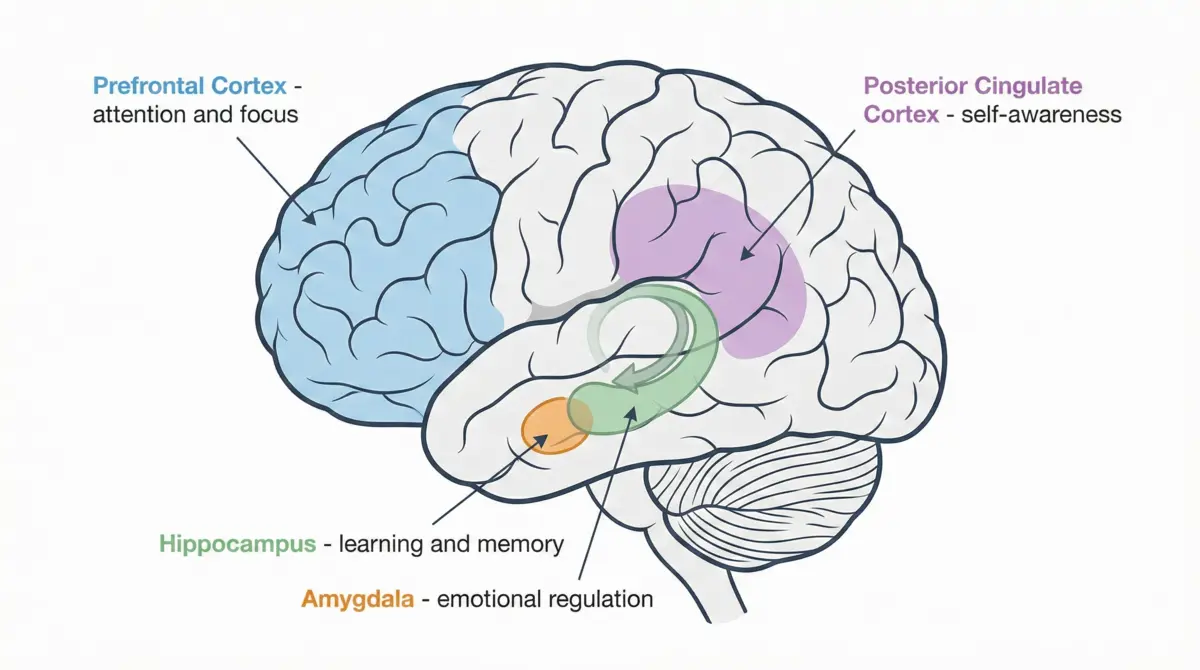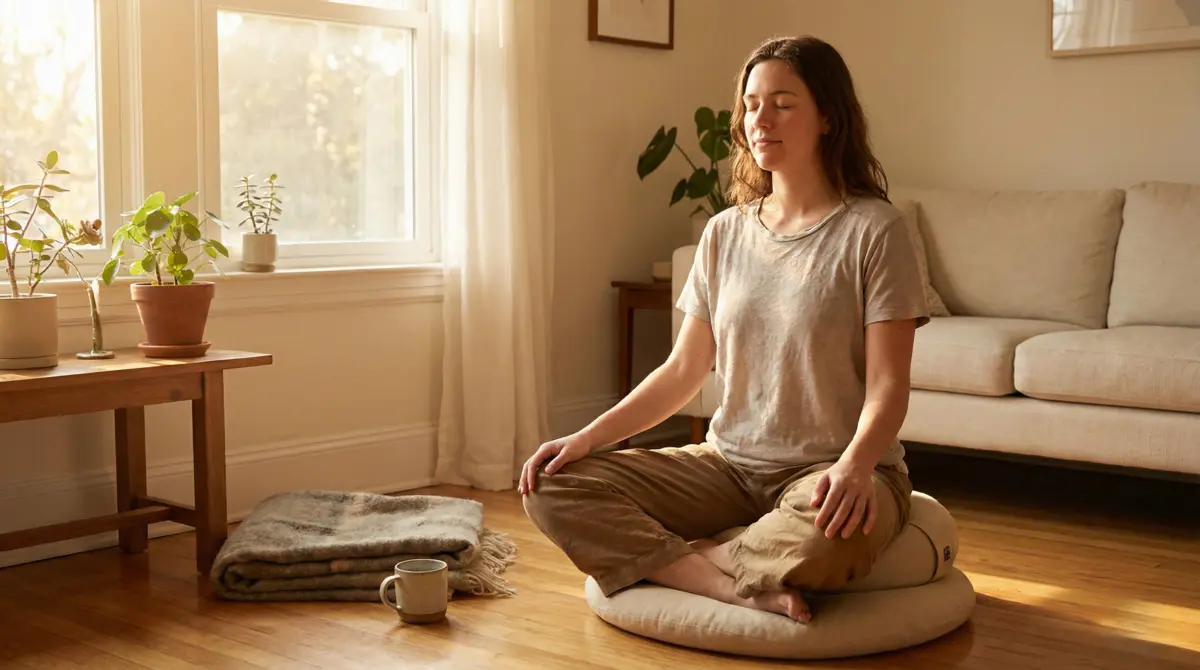Having Trouble Meditating? Your Complete Fix Guide

You sit down to meditate, and your mind races. Your body fidgets. You wonder if you’re doing it wrong. Here’s the truth: struggling with meditation is normal, not failure.
Research shows 25.5% of meditation practitioners were exposed to the practice within the last three years, and most face significant challenges. This guide gives you specific solutions to make meditation work for your life.
- Your wandering mind during meditation is normal brain function, not failure.
- Most meditation practitioners quit within 90 days; persistence matters more than perfect sessions.
- Start with 3 to 5 minute sessions and add 1 minute weekly.
- Physical discomfort, sleepiness, and boredom are fixable with specific technique adjustments.
- Progress shows up in subtle ways: noticing mind-wandering faster, returning to focus more easily.
Why Most People Have Trouble Meditating (And Why That’s Normal)
Meditation looks simple. Sit quietly. Focus your attention. But when you try it, your experience rarely matches that simplicity.
Your brain evolved to think, plan, and solve problems. Asking it to observe opposes millions of years of survival programming. This creates natural resistance that every meditator experiences.

The Real Statistics on Meditation Challenges
Most people learning meditation will give up within 90 days. Studies tracking meditation adherence show practice frequency drops from 76% during guided training to 55% afterward.
“This drop is normal, not a personal failure. When you have structured support, maintaining practice is easier. When you’re on your own, consistency requires more effort. Expect this transition and plan for it.”
The top two barriers? Time constraints affect 50.9% of practitioners. Prioritizing other tasks stops 51.5% according to the ncbi.
These numbers reveal something important. Difficulty meditating doesn’t mean you lack discipline. It means you’re experiencing what most people face.
What Happens in Your Brain When You Struggle
When your mind wanders during meditation, your default mode network activates. This brain network handles self-related thinking and mental time travel. It’s the system that reviews your past and plans your future.
Experienced meditators show reduced default mode network activity during practice. But beginners work against strong neural patterns. Your wandering mind isn’t a meditation failure; it’s the exact process you’re learning to work with.
The 5 Most Common Meditation Problems and How to Fix Them
Problem 1: Your Mind Won’t Stop Wandering
Every thought pulls your attention away. You notice you’ve been planning dinner for five minutes. You feel frustrated and wonder if meditation will ever work.
The solution: Wandering is the practice. When you notice your mind has wandered, you’ve just succeeded.
Try this specific technique:
Your mind will wander dozens of times. You’ll bring it back dozens of times. This repetition builds attention control that transfers beyond meditation.
Problem 2: Physical Discomfort and Restlessness
Your legs tingle, back aches. You need to shift position constantly. Physical discomfort derails many meditation attempts.
The solution: Start with shorter sessions and adjust your position.
Specific adjustments that help:
You’re not trying to sit like a statue. You’re finding a position that allows stillness without pain.
Research shows the average practice duration is 23 minutes per day during formal training. But this drops to 16 minutes afterward. Starting shorter and building gradually creates sustainable habits.

Problem 3: Falling Asleep During Practice
Meditation relaxes you. Then you start nodding off. Your brain interprets relaxation as sleep time.
The solution: Adjust your practice timing and physical state.
Specific wake-up strategies:
If you fall asleep once, it’s not wasted practice. Your body might need rest. Try again when you’re more alert.
Problem 4: Boredom and Feeling Like Nothing Is Happening
Meditation seems dull compared to your usual activities. You expect dramatic experiences but feel nothing special.
The solution: Reframe boredom and add variety.
Try these approaches:
Progress in meditation is subtle. Benefits accumulate slowly. Most practitioners need between 11 and 100 sessions before meditation feels natural.

Problem 5: Strong Emotions Surfacing
When you sit quietly, sadness appears. Or anxiety. Or anger. Strong feelings emerge without warning.
The solution: Work with emotions instead of pushing them away.
Emotion-handling technique:
If emotions become overwhelming, pause your practice. Talk to someone you trust: friend, teacher, or counselor. Meditation can surface material you need support processing.
| Meditation Style | Best For | Session Length | Difficulty |
|---|---|---|---|
| Guided meditation | Complete beginners needing structure | 5 to 15 minutes | Easy |
| Breath focus | Building basic concentration skills | 3 to 10 minutes | Easy to Moderate |
| Body scan | Physical tension and stress relief | 10 to 20 minutes | Moderate |
| Walking meditation | Restlessness, can’t sit still | 10 to 15 minutes | Easy |
| Loving-kindness | Self-criticism, emotional struggles | 10 to 20 minutes | Moderate |
| Mindful activities | Busy schedules, integrating practice | 5 to 30 minutes | Easy |
How to Choose Your First Meditation Style
No single meditation style works for everyone. Trying multiple approaches helps you find what fits.
Guided meditation: A voice leads you through the practice. Best for beginners who need structure.
Breath focus: Simple attention to breathing. Good for developing basic concentration.
Body scan: Systematic attention through different body parts. Helpful for physical tension.
Walking meditation: Slow, deliberate steps with full awareness. Ideal if sitting feels impossible.
Loving-kindness: Directing kind wishes toward yourself and others. Effective for self-criticism.
Mindful activities: Full attention during daily tasks like eating or brushing teeth.
Start with guided meditation for your first 10 sessions. This provides structure while you learn the basics. Then experiment with other styles.

Building a Practice That Actually Sticks
Consistency matters more than duration. A daily 5-minute practice beats occasional 30-minute sessions.
The Right Duration for Beginners
Research tracking novice meditators shows that successful practitioners average 23 minutes per day during structured training. But forcing this length from day one creates failure.
Start with 3 to 5 minutes daily. Add 1 minute per week. By week 10, you’re at 12 to 14 minutes. This gradual build prevents overwhelm.
Data shows practice adherence drops from 76% during structured training to 55% when practitioners continue alone. This 21-point drop happens to most people.
Your motivation will decrease without external accountability. Building slowly creates habits that survive this transition. Set reminders. Track practice days. Join an online group or find an accountability partner.
Creating Your Meditation Space
Your environment shapes your practice success. You don’t need an elaborate setup, just consistency and quiet.
Space requirements:
Optional additions: dimmed lighting, a candle, or a small cushion. These create environmental cues that signal practice time.

Timing Your Practice for Success
Same time daily builds stronger habits. Your brain begins anticipating practice, reducing resistance.
Best timing options:
Test each timing for one week. Notice which creates the most consistent follow-through.
When Progress Feels Slow
You’ve practiced for weeks, but don’t feel different. This creates doubt.
Research reveals 41.2% of meditation practitioners complete 11 to 100 sessions before establishing regular practice. Only 21.2% reach over 500 sessions.
Progress indicators you might miss:
These subtle shifts matter more than dramatic experiences. Meditation builds mental fitness gradually, like physical training.
Studies show meditation reduces default mode network activity over time. But these neural changes occur slowly. Your brain is restructuring; you can’t feel the process directly.
Signs You Might Need Extra Support
Most meditation challenges resolve with consistent practice and technique adjustments. But some situations require additional help.
Seek support if you experience:
A meditation teacher can adjust your technique. A therapist can help process difficult material. Some people benefit from trauma-informed meditation approaches.
Needing support doesn’t mean meditation isn’t for you. It means you’re being responsible about your mental health.
Subscribe to Create Higher Vibrations!
Get Inspiration and Practical advice straight to your inbox.
Frequently Asked Questions About Meditation Struggles
How long before meditation gets easier?
Most people notice reduced struggle after 15 to 25 sessions. Your mind still wanders, but you work with it more smoothly. Significant ease develops after 50 to 100 sessions.
Is my mind too busy for meditation?
No. A busy mind is exactly why you need meditation. The practice doesn’t require a quiet mind; it trains you to work with a busy one.
Should I meditate when I’m stressed or wait until I’m calm?
Meditate when stressed. Research shows stress is the primary motivator for regular meditation practice. Practicing during difficulty builds your skill most effectively.
How do I know if I’m doing it right?
If you notice when your mind wanders and bring it back, you’re doing it correctly. There’s no special feeling you should achieve.
What if I can’t sit still for even 5 minutes?
Try walking meditation or mindful movement first. Build stillness gradually. Some people need weeks of active practices before seated meditation works.
Do I need an app, or can I practice without technology?
Either works. Research shows first exposure through smartphone apps can actually reduce persistence compared to in-person learning. But apps provide a helpful structure for some beginners.
Why do I feel worse after meditating sometimes?
Meditation brings awareness to thoughts and feelings you normally avoid. This temporary discomfort often precedes improvement. But if it persists, reduce session length or get support.
How many times per week should I practice?
Daily practice builds skills fastest. But research defines successful meditation as four or more sessions weekly. Aim for daily, accept when you hit four.
What’s the biggest mistake beginners make?
Setting unrealistic expectations. Expecting immediate calm or perfect focus creates unnecessary failure. Progress is slow and subtle.
When should I give up on meditation?
If meditation consistently worsens your mental health despite adjustments and support, other practices might fit better. But normal struggle isn’t a reason to quit.
You’re not failing at meditation when it feels hard. You’re experiencing the normal learning process. Every time you notice your wandering mind and return to focus, you’re building attention control. Every uncomfortable session teaches you to sit with difficulty.
The practitioners who succeed don’t have naturally calm minds. They simply keep practicing through the challenges. Start with 5 minutes. Show up daily. Be patient with the process.
Your meditation practice won’t look like anyone else’s. Find what works for your brain, body, and schedule. The real progress happens in how you handle stress, focus, and emotions throughout your day. That’s where meditation transforms you.


